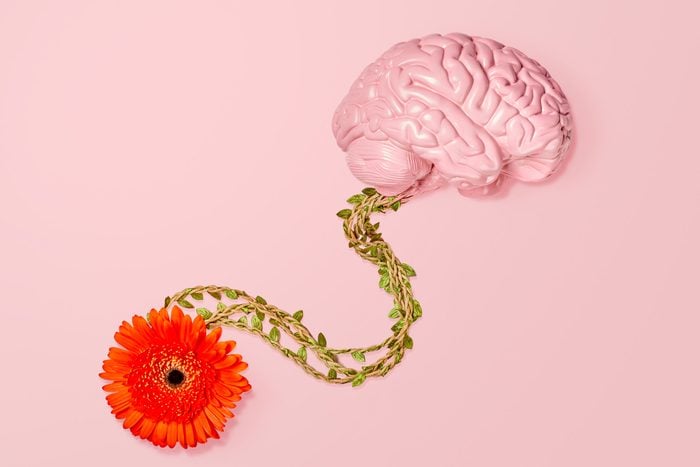Gut Instincts: How to Trust Your Intuition and Start Making Smarter Decisions
Updated: Jan. 25, 2024

The gut-brain connection is real. So how can you better trust your gut instincts? Experts share the secret to tuning in to this superpower.
NBA legend Lebron James once shared a valuable piece of advice he’d gotten from one of the world’s most successful business magnates: “Warren Buffett told me once [to] always follow your gut. When you have that gut feeling, you have to go with [it]. Don’t go back on it.” Wise words from two wise men—or are they? What does it really mean to trust your gut, and is a gut instinct a reliable source of information?
“A gut instinct is a phrase people use to describe a very real phenomenon where the brain is interpreting information from the environment faster than you can consciously recognize it,” says Vince Callahan, PhD, a neuro-educational psychologist known as the Mind Doctor and the CEO of the Florida Institute for Neural Discovery. “It’s your brain telling you something important, and you should pay attention to it.”
There are several types of intelligence, including cognitive intelligence and emotional intelligence, but your gut instinct goes way deeper than that. This is a primal instinct, leftover from the days when humans had to decide in an instant whether they should fight, fly (run away) or freeze, he explains. “Gut feelings are there for a reason: to protect you,” he says.
Understanding how the brain-gut connection works—and how to use it to your advantage—is a great step in learning how to be smarter and how to trust your decision-making. We asked Callahan, along with a gut doctor and a professor of psychology, to share everything you need to know about what, when and how to go with your gut.
Get Reader’s Digest’s Read Up newsletter for humor, cleaning, travel, tech and fun facts all week long.
What it means to trust your gut
Trusting your gut means making decisions based mainly, or solely, on an instinctive feeling you have, says Jeff Temple, PhD, a licensed psychologist and professor at the University of Texas Medical Branch. This phrase and other similar versions—”go with your gut,” “I feel it in my gut,” “I have a gut instinct”—are a way to remind people to tune in to the subtle, even subconscious, messages your brain is trying to give you.
Gut instincts often happen in a flash, and people may have a hard time describing what, exactly, they mean or why they feel that way, Callahan says. This ambiguity can lead some people to see their gut as a kind of psychic superpower, while it makes others trust it less because it doesn’t seem to be based in real-world data.
“It can be confusing,” Callahan says. “Your senses are constantly bringing in a barrage of information from your environment, and your brain processes it so quickly that it can almost seem like magic.”
The brain-gut connection is real
Trusting your gut may seem like an unexplainable feeling, but it’s based in very real biology, explains gut expert Rudolph Bedford, MD, a gastroenterologist at Providence Saint John’s Health Center in Santa Monica, California. “Gut feelings do actually happen in the gut,” he says. “Your brain is directly tied to your gut through a network of neurons.”
It starts with your enteric nervous system (ENS), a part of the nervous system that controls the function of the gastrointestinal tract, he explains. These neural circuits are in charge of normal gut things like motor functions, mucosal transport and secretions (poop) and immune functions. But the ENS has another job: modulating neurotransmitters like serotonin and dopamine (which affect mood) and neurohormones like norepinephrine and vasopressin (which affect how your body acts on your mood).
Your gut is more powerful than you think when it comes to your feelings, whether they’re negative or positive feelings. In fact, 95% of your serotonin and more than 50% of your body’s dopamine is synthesized in your gut, not your brain. Confused? Here’s how it works in real life: Your boss asks to meet with you unexpectedly, in private. Your brain is scanning the environment and picks up on cues in your boss’s face, voice and mannerisms. It triggers a “gut feeling” of mental unease and anxiety, which in turn makes your stomach feel physically tense and nauseous. Your gut is telling you to be cautious, but all you know is that you felt sick to your stomach as soon as your boss talked to you.
Another example is that feeling of butterflies in the stomach when you’re nervous or excited. Or how when you feel scared, you may feel like pooping (or, heaven forbid, actually poop your pants in fear). “So when people say they ‘feel something in their gut,’ it’s literally true,” Dr. Bedford says.
What it can feel like when your gut is trying to tell you something
Most people have a specific feeling they notice with a gut instinct, and it can vary widely from person to person, Dr. Bedford says. Some common physical sensations include:
- Dyspepsia (indigestion or heartburn)
- A fluttery feeling in the stomach
- Tightening of the stomach muscles, like you’re preparing for a gut punch
- Pain
- Nausea
- Lack of appetite
- Dry mouth or too much saliva
- A churning feeling in the stomach
Mentally, people often feel unsettled, aroused, suddenly alert, afraid, excited, on edge, uneasy, hyperaware and/or confused, Callahan says.
How to tune in to your gut
Your gut is giving you valuable information about things that are happening around you, so you should try to tune in to it when you start to get those mental or physical symptoms. The biggest challenge people face when trying to “listen” to their gut is learning how to focus and separate those instincts from generalized anxiety, fear or excitement, Dr. Bedford says. If you know how to learn something new and how to remember things, these will really help you, as listening to your gut is a learned skill you can improve upon over time with practice.
Here are some expert tips for really homing in on what your gut is trying to tell you:
- Note your emotional environment. Name your feelings.
- Look around you for things that may be causing your feelings.
- Learn how to read body language and pay attention to how others are acting.
- Think back to the last time you felt this way and what it meant.
- Do some deep breathing, meditation or other method to calm your mind so you can focus.
- Keep a “gut instincts” journal to help you recognize patterns and how and when you feel them.
- Ask questions of yourself and others.
Times you should trust your gut—and times you shouldn’t
Your gut is pretty accurate at discerning things, but it’s only as good as the information it’s receiving from your senses—and sometimes those aren’t as accurate. The problem, Callahan explains, is that most of us live in a chronic state of stress, which warps our perceptions and gut feelings.
“If you’re under constant, toxic stress, then your gut may turn small red flags into huge danger alerts, which can make you overly cautious or fearful,” he says. “One of the biggest signs of toxic stress is constantly having a gut feeling that something is wrong.”
The solution is to reduce your stress and to make your gut instinct just one part of your decision-making process—not the whole thing. Dr. Bedford has a formula: gut feelings + environment + knowledge + senses. Ignoring any one of these or focusing solely on one to the exclusion of the others is a recipe for disaster, he adds.
“I’d say avoid going with gut feelings for analytical decisions or betting on horses,” Temple agrees. “When you have external data to inform your decisions, always go with the data. But for personal decisions, trust your instinct—science shows that it’s right more often than not.”
Bottom line: Go with your gut, but use your brain.
About the experts
- Jeff Temple, PhD, is a licensed psychologist, professor and the John Sealy Distinguished Chair in Community Health at the University of Texas Medical Branch. He’s the director of the Center for Violence Prevention and has more than 230 scholarly publications in a variety of high-impact journals, including JAMA.
- Rudolph Bedford, MD, is an expert in gut health and a gastroenterologist at Providence Saint John’s Health Center in Santa Monica, California.
- Vince Callahan, PhD, known as the Mind Doctor, is a mental health professional, neuro-educational psychologist and the CEO of the Florida Institute for Neural Discovery.


